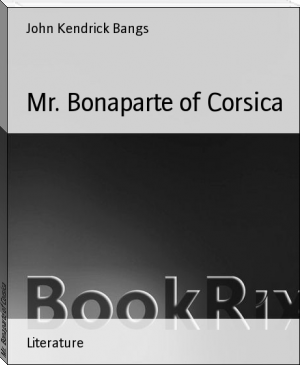Mr. Bonaparte of Corsica by John Kendrick Bangs (good non fiction books to read TXT) 📖

- Author: John Kendrick Bangs
Book online «Mr. Bonaparte of Corsica by John Kendrick Bangs (good non fiction books to read TXT) 📖». Author John Kendrick Bangs
The succeeding two years were but repetitions of the first year of the Empire. Bonaparte proceeded from one victory to another. Prussia was humbled. The French Emperor occupied Berlin, and, as he had done in Italy, levied upon the art treasures of that city for the enrichment of Paris.
"We'll have quite a Salon if we go on," said Bonaparte.
"Anybody'd think you were getting up a corner in oil," said Frederick, ruefully, as he watched the packers at work boxing his most treasured paintings for shipment.
"We am getting up a corner in all things," retorted Bonaparte. "Paris will soon be the Boston of Europe--it will be the Hub of the Universe."
"You might leave me something," said the Prussian king. "I haven't an old master left."
"Well, never mind," said Napoleon, soothingly. "We'll be a young master to you. Now go to bed, like a good fellow, and take a good rest. There's a delegation of Poles waiting for me outside. They think We am going to erect a telegraph system to Russia, and they want employment."
"As operators?" asked Frederick, sadly.
"No, stupid," returned Napoleon, "as Poles."
The Prussian left the room in tears. To his great regret policy compelled Bonaparte to decline the petition of the Polanders to be allowed to rehabilitate themselves as a nation. As we have seen, he was a man of peace, and many miles away from home at that, and hence had no desire to further exasperate Russia by meddling in an affair so close to the Czar's heart. This diplomatic foresight resulted in the Peace of Tilsit. The Czar, appreciating Bonaparte's delicacy in the matter of Poland, was quite won over, and consented to an interview by means of which a basis might be reached upon which all might rest from warfare. Tilsit was chosen as the place of meeting, and fearing lest they might be interrupted by reporters, the two emperors decided to hold their conference upon a raft anchored in the middle of the river Niemen. It must be remembered that tugs had not been invented at this time, so that the raft was comparatively safe from those "Boswells of the news," as reporters have been called. Fouche was very anxious about this decision however.
"Look out for yourself, my dear Emperor," he wrote. "Wear a cork suit, or insist that the raft shall be plentifully supplied with life-preservers. Those Eastern emperors would like nothing better than to have you founder in the Niemen."
"We are not afraid," Napoleon replied. "If the craft sinks We shall swim ashore on Alexander's back." Nevertheless, all other historians to the contrary, Bonaparte did wear a cork suit beneath his uniform. We have this on the authority of the nephew of the valet of the late Napoleon III., who had access to the private papers of this wonderful family.
Nothing disastrous occurred upon this occasion in spite of the temptation thrown in Alexander's way to sink the raft and thus rid the world of a dangerous rival to his supremacy. The conference resulted in a treaty of peace, concluded on the 7th of July, 1807, and by it a few more thrones were added to the Bonaparte collection. Jerome, who had been trying to make a living as a music teacher in America, having been divorced from his American wife and married to another, was made King of Westphalia.
"Having made a failure in the West, my dear brother," said Bonaparte, "what could be more appropriate?"
Louis was made King of Holland, and Joseph's kingship of Naples was fully recognized, and, further, Bonaparte was enabled to return to Paris and show himself to the citizens of that fickle city, who were getting restive under Josephine's rule.
"They like Josephine well enough," wrote Fouche, "but the men prefer to have you here. The fact that things run smoothly under a woman's rule is giving the female suffragists a great boom, and the men say that domestic life is being ruined. Cooks are scarce, having deserted the kitchen for the primaries, and altogether the outlook is effeminate. Therefore, come back as soon as you can, for if you don't the first thing we know the women will be voting, and you'll find you'll have to give up your seat to a lady."
The Emperor's return to Paris was marked by great rejoicing, particularly by the large number of hatters and laundresses and stable-boys whom he had in the meantime paid for their early services by making them dukes and duchesses. The court was magnificent, and entirely new. No second-hand nobles were allowed within the sacred circle, and the result was one of extreme splendor. In a small way, to maintain the interest which he had inspired, as well as to keep up the discipline of his army, a few conquests, including those of Spain and Portugal, were indulged in. Joseph was removed from a comfortable, warm throne at Naples and made King of Spain, and Murat was substituted for him at Naples. The Emperor's elder brother did not like the change, but submitted as gracefully as ever.
"Naples was extremely comfortable," he said, "but this Madrid position is not at all to my taste. I prefer macaroni to garlic, and I cannot endure these Carmencita dances--they remind me too much of the green-apple season in the old Corsican days. However, what my brother wills I do, merely from force of habit--not that I fear him or consider myself bound to obey him, mind you, but because I am averse to family differences. One must yield, and I have always been the self-sacrificing member of the family. He's put me here, and I hope to remain."
This promotion of Joseph was a misstep for one who desired peace, and Bonaparte soon found another war with Austria on the tapis because of it. Emperor Francis Joseph, jealous perhaps of the copyright on his name, declined to recognize King Joseph of Spain. Whereupon Bonaparte again set out for Austria, where, on the 6th of July, 1809, Austria having recognized the strength of Bonaparte's arguments, backed up, as they were, by an overwhelming force of men, each worthy of a marshal's baton, and all confident, under the new regime, of some day securing it, an armistice was agreed upon, and on the 14th of October a treaty satisfactory to France was signed.
"If I have to come back again, my dear Emperor Joseph," Bonaparte said, as he set out for Paris, "it will be for the purpose of giving you a new position, which you may not like so well as the neat and rather gaudy sinecure you now hold."
"Which is--?" added the Austrian.
"I'll bring you a snow-shovel and set you to clearing off the steps."
"What steps?" queried the Austrian anxiously.
"The back-steppes of Russia," replied Napoleon, sternly. "The only thing that keeps me from doing it now is that I--ah--I hate to do anything unkind to the father of--ah--your daughter Marie-Louise, whom I met at the dance last night, and who, between you and me, looks remarkably like the only woman I ever loved."
CHAPTER X: THE FALL OF THE EMPIRE 1810-1814
Just before the opening of the year 1810, which marked the beginning of Bonaparte's decay, Fouche demanded an audience.
"Well, Fouche," said the Emperor, "what now?"
"This Empire can't go much further, Your Majesty, unless more novelty is introduced. I've had my men out all through France taking notes, and there's but one opinion among 'em all. You've got to do something new or stop the show. If you'd only done what I suggested at Austerlitz, and lost a leg, it would have been different. The people don't ask much song-and-dance business from a one-legged man."
"We compromised with you there," retorted Napoleon. "At Ratisbon our imperial foot was laid up for a week."
"Yes--but you didn't lose it," returned Fouche. "Can't you see the difference? If you'd lost it, and come home without it, there'd have been evidence of your suffering. As it is, do you know what your enemies are saying about your foot?"
"We do not," said the Emperor, sternly. "What do they say?"
"Well, the Bourbons say you stepped on it running away from the enemy's guns, and the extreme Republicans say your wound is nothing but gout and the result of high, undemocratic living. Now, my dear sir--Sire, I mean--I take a great deal of interest in this Empire. It pays me my salary, and I've had charge of the calcium lights for some time, and I don't want our lustre dimmed, but it will be dimmed unless, as I have already told you a million times, we introduce some new act on our programme. 1492 didn't succeed on its music, or its jokes, or its living pictures. It was the introduction of novelties every week that kept it on the boards for four hundred years."
"Well--what do you propose?" asked Bonaparte, recognizing the truth of Fouche's words.
"I--ah--I think you ought to get married," said Fouche.
"We am married, you--you--idiot," cried Bonaparte.
"Well, marry again," said Fouche. "You've been giving other people away at a great rate for several years--what's the matter with acquiring a real princess for yourself?"
"You advise bigamy, do you?" asked Bonaparte, scornfully.
"Not on your life," returned Fouche, "but a real elegant divorce, followed by an imperial wedding, would rattle the bones of this blase old Paris as they haven't been rattled since Robespierre's day."
Bonaparte reddened, then, rising from the throne and putting his hand to the side of his mouth, he said, in a low, agitated tone:
"Close the door, Fouche. Close the door and come here. We want to whisper something to you."
The minister did as he was bidden.
"Fouche, old boy," chuckled the Emperor in the ear of his rascally aide--"Fouche, you're a mind-reader. We've been thinking of just that very thing for some time--in fact, ever since We met that old woman Emperor Francis Joseph. He'd make an elegant mother-in-law."
"Precisely," said Fouche. "His daughter Marie-Louise, an archduchess by birth, is the one I had selected for you. History will no doubt say that I oppose this match, and publicly perhaps I may seem to do so, but you will understand, my dear Sire, that this opposition will serve, as it is designed to serve, as an advertisement of our enterprise, and without advertising we might as well put up the shutters. Shall we--ah--announce the attraction to the public?"
"Not yet," said Napoleon. "We must get rid of our leading lady before we bring on the understudy."
It is a sad chapter in the history of this eminent man wherein is told the heart-breaking story of his sacrifice--the giving up through sheer love of his country of the only woman he had ever loved, and we should prefer to pass it over in silence. We allude to it here merely to show that it was brought about by the exigencies of his office, and that it was nothing short of heroic self-abnegation which led this faithful lover of his adopted native land to put the beautiful Josephine away from him. He had builded an Empire for an opera bouffe people, and he was resolved to maintain it at
 Have you ever thought about what fiction is? Probably, such a question may seem surprising: and so everything is clear. Every person throughout his life has to repeatedly create the works he needs for specific purposes - statements, autobiographies, dictations - using not gypsum or clay, not musical notes, not paints, but just a word. At the same time, almost every person will be very surprised if he is told that he thereby created a work of fiction, which is very different from visual art, music and sculpture making. However, everyone understands that a student's essay or dictation is fundamentally different from novels, short stories, news that are created by professional writers. In the works of professionals there is the most important difference - excogitation. But, oddly enough, in a school literature course, you don’t realize the full power of fiction. So using our website in your free time discover fiction for yourself.
Have you ever thought about what fiction is? Probably, such a question may seem surprising: and so everything is clear. Every person throughout his life has to repeatedly create the works he needs for specific purposes - statements, autobiographies, dictations - using not gypsum or clay, not musical notes, not paints, but just a word. At the same time, almost every person will be very surprised if he is told that he thereby created a work of fiction, which is very different from visual art, music and sculpture making. However, everyone understands that a student's essay or dictation is fundamentally different from novels, short stories, news that are created by professional writers. In the works of professionals there is the most important difference - excogitation. But, oddly enough, in a school literature course, you don’t realize the full power of fiction. So using our website in your free time discover fiction for yourself. 




Comments (0)